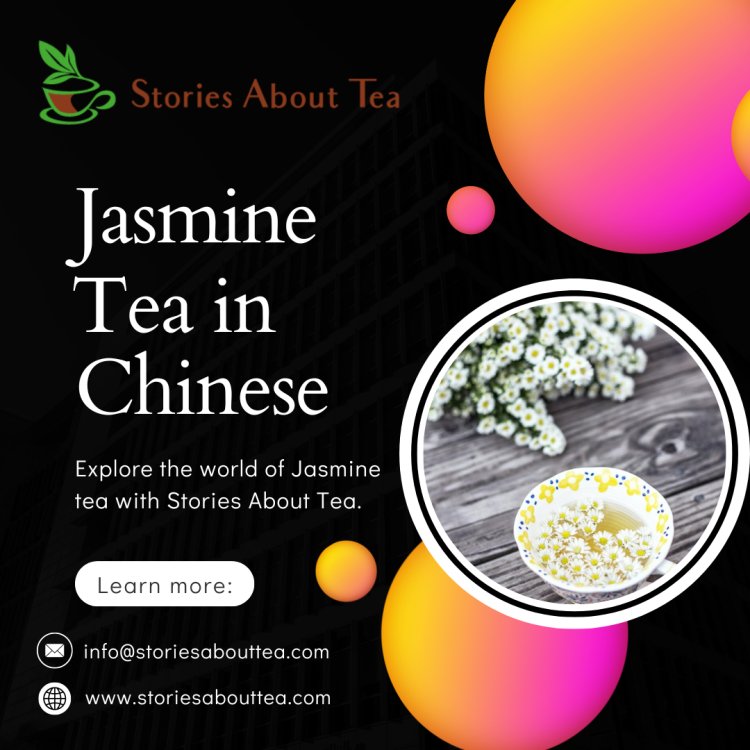The Allure of Jasmine Tea in Chinese Culture
To learn more about jasmine tea and other fascinating teas from around the world, visit our website, Stories About Tea, and start your tea adventure today!
Share this Post to earn Money ( Upto ₹100 per 1000 Views )

Jasmine tea, or "茉莉花茶" (mòlì huāchá) in Chinese, is one of the most beloved teas in China. Known for its delicate floral aroma and soothing taste, jasmine tea has been cherished for centuries. In Chinese culture, this tea represents a harmonious blend of nature's finest elements, marrying the fragrant essence of jasmine blossoms with high-quality green tea leaves. At Stories About Tea, we explore the history, cultural significance, and unique qualities that make jasmine tea a staple in Chinese households.
The Origins of Jasmine Tea
Jasmine tea traces its roots back to the Song Dynasty (960–1279 AD) in China, although it became widely popular during the Ming Dynasty (1368–1644 AD). Traditionally, this tea is crafted by layering fresh jasmine flowers with green tea leaves, allowing the tea to absorb the flower’s fragrance overnight. This process is repeated several times to achieve the perfect balance of flavor and aroma. The result is a tea that is not only pleasing to the senses but also rich in cultural heritage.
How Jasmine Tea is Made
The production of jasmine tea is an art form. High-quality green tea leaves, often harvested in the spring, are carefully selected and stored until the jasmine flowers bloom in the summer. Once the flowers are in full bloom, they are picked early in the day while their aroma is at its peak. The flowers are then mixed with the tea leaves, allowing the leaves to absorb the natural oils and scent of the jasmine blossoms.
This scenting process is labor-intensive and may be repeated multiple times to ensure the tea reaches its desired fragrance level. The more times the tea is scented, the higher its quality. At Stories About Tea, we delve into these intricate methods, uncovering the secrets behind the perfect cup of jasmine tea.
The Health Benefits of Jasmine Tea
Jasmine tea is not only delicious but also packed with numerous health benefits. As a green tea base is often used, it is rich in antioxidants, which help combat free radicals in the body and reduce the risk of chronic diseases. Additionally, jasmine tea has been known to aid in digestion, promote relaxation, and even improve heart health. Its natural calming properties make it an ideal choice for unwinding after a long day. At Stories About Tea, we provide more insights into the health benefits of jasmine tea and why it is an excellent addition to your daily routine.
Cultural Significance of Jasmine Tea in China
In Chinese culture, jasmine tea is much more than just a beverage. It is a symbol of hospitality and respect. Traditionally, serving jasmine tea to guests signifies a warm welcome and a gesture of friendship. The tea is also often associated with good luck, purity, and love. It is frequently served at weddings and other celebrations, highlighting its cultural importance.
Jasmine tea also plays a significant role in Chinese tea ceremonies, where its preparation and presentation are considered an art form. The aroma of jasmine tea is said to create a calm and peaceful atmosphere, making it a popular choice for meditative practices. Stories About Tea takes you through the many ways jasmine tea is interwoven into Chinese customs and traditions.
How to Brew the Perfect Cup of Jasmine Tea
Brewing jasmine tea is a simple yet mindful process. To brew the perfect cup, start with high-quality loose-leaf jasmine tea. Use water heated to about 175–185°F (80–85°C) to avoid burning the delicate leaves. Steep the tea for 2-3 minutes, allowing the floral notes to fully develop without becoming too bitter.
For those who prefer a stronger flavor, additional steeping can be done, but remember that over-steeping may result in a bitter taste. At Stories About Tea, we offer detailed brewing tips to help you enjoy your jasmine tea experience to the fullest.
Pairing Jasmine Tea with Food
Jasmine tea is incredibly versatile and pairs well with a variety of foods. Its light and floral flavor complements both sweet and savory dishes, such as dumplings, light salads, and desserts like mooncakes or almond cookies. The tea's subtle sweetness and fragrant aroma enhance the flavors of these dishes, making it a popular choice in Chinese cuisine.
Conclusion
Jasmine tea is more than just a drink; it’s an experience steeped in tradition, culture, and health benefits. Its fragrant aroma, delicate taste, and cultural significance make it a beloved tea across China and beyond. Whether you’re a seasoned tea lover or just beginning your tea journey, jasmine tea offers a delightful way to explore the rich world of Chinese tea culture.
To learn more about jasmine tea and other fascinating teas from around the world, visit our website, Stories About Tea, and start your tea adventure today!

 storiesabouttea
storiesabouttea 













